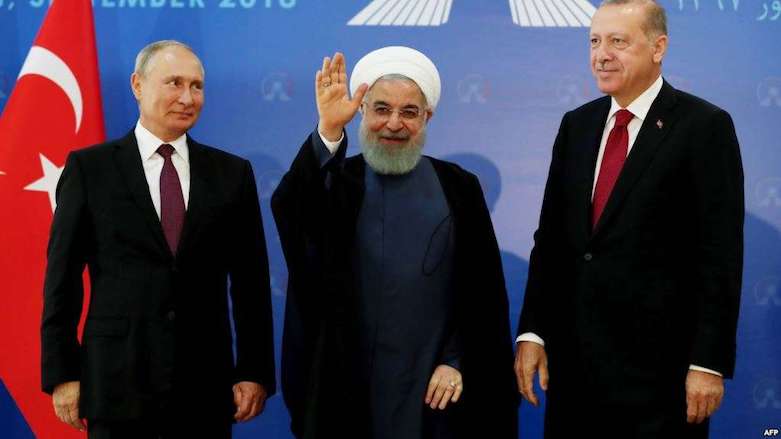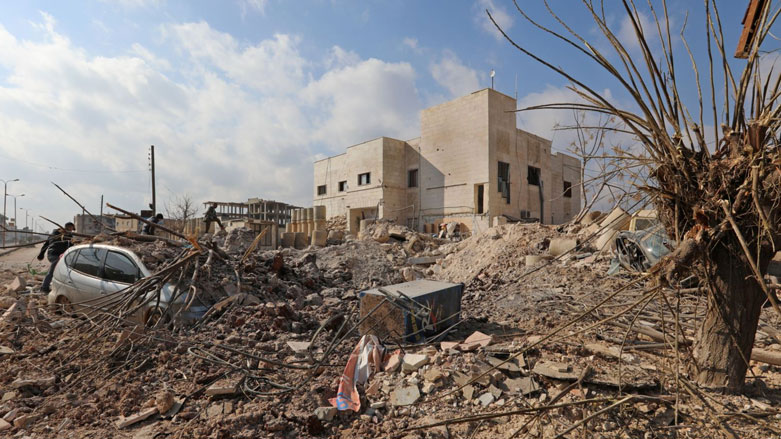Airstrikes hit Idlib but no signs of ground attack yet

ERBIL (Kurdistan 24) – A spokesperson for the Free Idlib Police on Saturday confirmed that the Syrian government and Russian warplanes started bombing Idlib following yesterday’s meeting between Turkey, Iran, and Russia in Tehran.
“The regime started its operation by bombing some villages. Today, there are four deaths and five casualties in a village in Hama countryside, and there are some casualties in Hass in Idlib countryside,” Mahmoud Abbi, a Free Idlib Police spokesperson, told Kurdistan 24.
“Moreover, the four deaths and five casualties are from Khan Sheikhoun in Idlib countryside. But there are bombings in Hama countryside,” he added.
Meanwhile, a spokesperson for the White Helmets, Khaled Khattib, confirmed that many airstrikes hit civilian areas in Idlib, but no ground attacks had started yet.
“Over eight have been killed and many injured in different areas in Idlib,” he said.
Experts say the Syrian government is getting closer to launching an assault on rebel-held northwestern Idlib, which according to the United Nations could displace over 700,000 people.
A Syrian government source told Kurdistan 24 on Sept. 5 that the offensive already started “gradually.”
Idlib, a strategic governorate that borders Turkey and hosts over two million people, is the last major territory still in militant hands.
A part of it is held by the Hay’at Tahrir al-Sham (HTS), that the US links to al-Qaida, and rebels backed by Turkey control another part.
According to Abbi, the attacks are only by air, and there are no signs that a ground invasion has begun.
The 32 Centers of the Free Idlib Police provided security for the protest on Friday that condemned Moscow and Damascus’ plans to launch an assault on Idlib.
“We hope Turkey and the whole world will help us stop Russian and regime attacks. We decided to resist if the situation required,” he added.
Civilians will most likely flee toward the Turkish border or areas under the control of Turkey in northern Aleppo, such as Afrin, Azaz, Jarabulus and Bab, the spokesperson confirmed.
“Some people went from Jisr al-Shugur to Jindiris, in Afrin. But for now, civil society works peacefully to avoid civilians fleeing to anywhere,” Abbi said.
Turkey failed to convince Russia and Iran in a meeting on Friday to back a ceasefire in Idlib.
Nicholas A. Heras, a Middle East security analyst at the Washington-based Center for a New American Security, told Kurdistan 24 that the latest airstrikes were most likely a message to Turkey.
“The Russians had hoped that coming out of the Tehran meetings they would be able to intimidate Erdogan into agreeing to withdraw the Turkish presence from Idlib and, as a result, give Assad and Russia an easy win in northwest Syria,” he added.
According to Heras, Russia is “unhappy” that it was unable to convince Erdogan to agree to a withdrawal from Idlib, especially as the Geneva meetings are approaching next week.
“This is a clear example that Russia wants to send a message to Turkey, that Russia wants the Astana process, not the Geneva process to rule the future of Syria.”
The United States has warned of a severe humanitarian crisis ahead of the Idlib offensive.
On Saturday, Gen. Joseph Dunford, Chairman of the Joint Chiefs of Staff, reiterated remarks he made earlier in the week, warning of a “humanitarian catastrophe.”
He also said he was “disappointed, but not surprised” by the stalemate of the Idlib talks.
“It looks to us as if people are walking away from an agreed-upon approach to deal with Idlib,” Gen. Dunford said, referring to a previous agreement which designated Idlib a deconfliction zone.
Meanwhile, UN Syria Envoy Staffan de Mistura earlier announced that discussions with senior Russian, Turkish and Iranian officials would take place on Sept. 10-11 for the new process.
Those talks will continue on Sept. 14 with senior delegations from Egypt, France, Germany, Jordan, Saudi Arabia, Britain, and the United States.
Editing by Karzan Sulaivany

